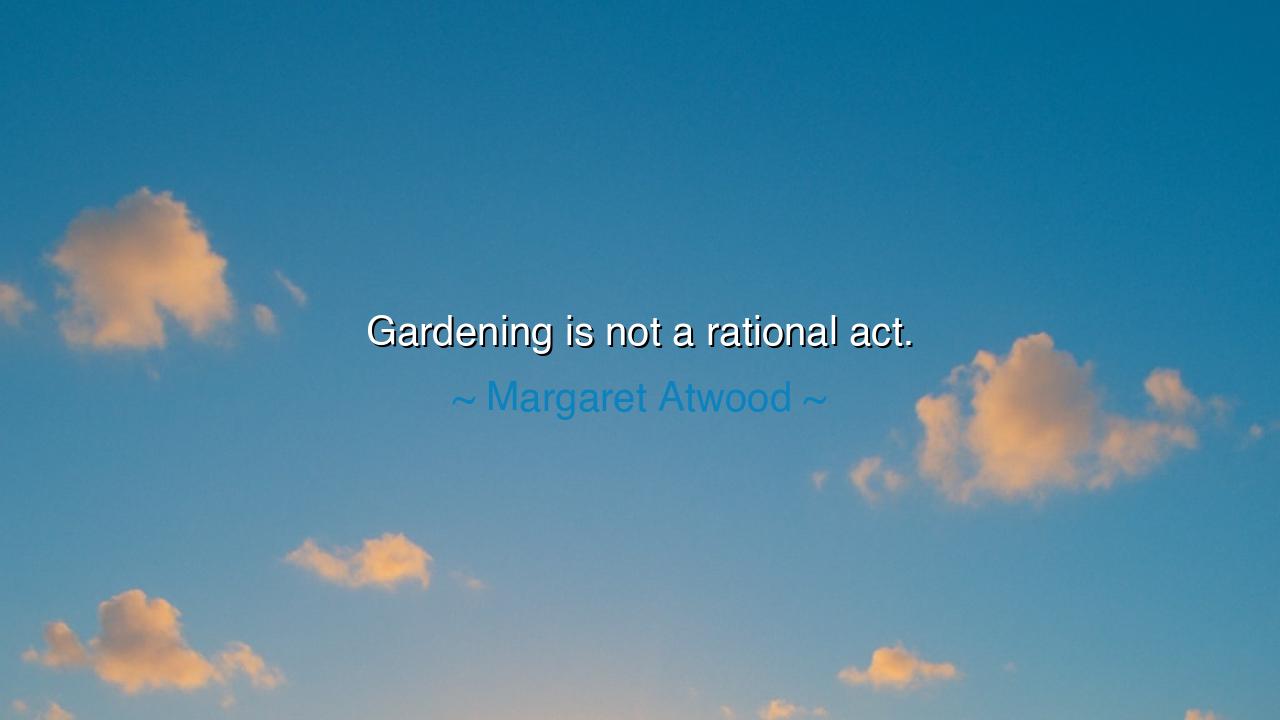
Gardening is not a rational act.






In the delicate balance between reason and nature, there exists a space where the heart and spirit are free to engage in the most mysterious and illogical of acts. Margaret Atwood, in her bold statement, “Gardening is not a rational act,” touches upon an ancient truth that transcends the world of logic and reason. Gardening, at its core, is an act of faith, an act of connection with the earth, where intuition and emotion guide us more than thought or analysis. To plant a seed, to tend to the land, is to step into a realm where reason cannot always guide the way. It is an act of love and devotion to life itself, not bound by the rigid constraints of the mind but flourishing in the more fluid, ever-changing rhythms of the world.
The ancients understood that the act of cultivation was not just a means of survival, but an engagement with something much greater. The Greek philosophers often spoke of the necessity of balance between the mind and the soul. Aristotle, for example, defined a life of virtue as one in which reason harmonizes with the natural world. However, in the act of gardening, reason alone is insufficient. The gardener must surrender to the earth, trusting the process of growth, knowing that not every seed will sprout, and not every garden will flourish according to the plan. Gardening requires more than logic; it requires patience, intuition, and a certain mystical connection with nature, much as the ancient Greeks revered the divine forces of nature that shaped their world.
In ancient Egypt, the art of agriculture was sacred. The Egyptians saw the act of planting and harvesting not just as work, but as an offering to the gods. The Nile River, which provided water to their crops, was considered a divine gift, and the process of cultivating the land was seen as an act of harmony between the human and the divine. The pharaohs themselves were often depicted as guardians of the land, working in concert with nature to ensure prosperity. Yet, even in this deeply spiritual practice, there was an element of trust and faith that transcended the rational mind. No farmer could predict the floods, nor could they guarantee a bountiful harvest; instead, they planted, nurtured, and prayed, with the belief that nature would respond in its own time and in its own way.
In the Roman Empire, gardening was celebrated as an act of both pleasure and philosophy. Cicero, the great Roman statesman and philosopher, believed that the garden was a place for the cultivation of virtue and reflection. In his writings, he praised the simplicity of life in the garden, where one could retreat from the complexities of politics and philosophy. But even for Cicero, gardening was not a purely rational act—it was a meditative practice, where one could lose themselves in the rhythm of the earth and experience a profound connection to the natural world. The process of planting, tending, and waiting, though rooted in work, was also deeply tied to the human spirit. To garden was to engage with the world in a way that surpassed logic—it was to embrace the mystery of life itself.
Margaret Atwood’s assertion that gardening is not a rational act reflects the essence of what it means to be human—to acknowledge that life cannot always be explained, controlled, or understood. There are forces in the world, both within us and around us, that defy logic. The seasons, the cycles of nature, the ebb and flow of life itself—these cannot be rationalized. We may plant our seeds with the hope and intention that they will grow, but ultimately, nature is its own master. The act of gardening, then, is an act of surrender, a willingness to engage with the world in its entirety—its chaos, its beauty, and its unpredictability. In this way, gardening is a practice of humility, where the gardener submits to the rhythms of the earth and allows nature to reveal itself on its own terms.
A modern example of this truth can be found in the life of Wangari Maathai, the Kenyan environmental activist and Nobel Peace Prize laureate. Through her Green Belt Movement, Maathai encouraged the planting of trees to combat deforestation, promote peace, and empower women. Her work was rooted in action and faith—faith that small actions, like planting trees, could bring about a larger change. Yet, even in this practical endeavor, there was a sense that not all could be controlled—the trees might not take root, the rains might not come, or the soil might be too poor. And yet, Maathai continued to plant, trusting in the power of nature, in the power of community, and in the understanding that not all things in life can be calculated. The green belt she helped to create was not born from rational planning alone, but from a belief in the interconnectedness of life and the importance of nurturing it without knowing what the ultimate outcome might be.
The lesson in Atwood’s words is one of faith, humility, and presence. Gardening, like life itself, is not always a rational act, nor should it be. There is a profound beauty in embracing the mystery and chaos of nature, in planting without knowing exactly what the future holds. To garden is to trust in the rhythms of the earth, to engage with the world without the need for complete control or understanding. We are invited to step away from the rational mind and embrace the mystery, to let go of our need for certainty and simply allow ourselves to be part of the ever-changing landscape of life. In this, we find the freedom to engage with the world not through the lens of logic, but through the heart, through the intuition, and through the living connection we share with all things.






AAdministratorAdministrator
Welcome, honored guests. Please leave a comment, we will respond soon